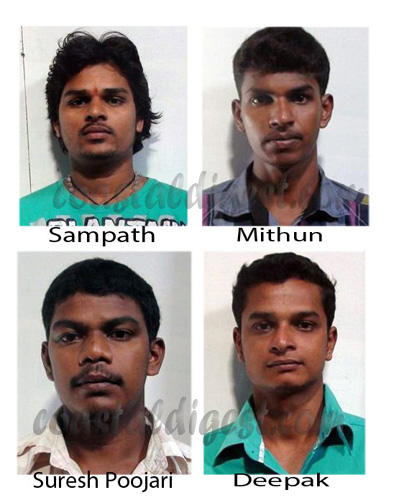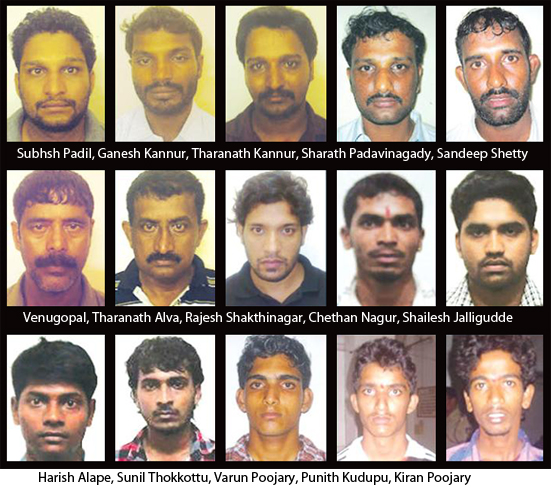
Mangalore, August 2: seven more persons have been arrested by the Mangalore police in connection with the homestay attack case where young boys and girls were manhandled by saffron activists at a birthday party at Morning Mist home stay at Padil on Thursday.
The arrested have been identified as Suresh Poojari (24), son of Subbu Poojari, resident of Veeranagara, Mithun (21), son of Sanjeeva Poojari, residing near Sooryanarayana Temple at Maroli, Sampath (23), son of Vasu Poojari, resident of Kandavara, Gurupura Kaikamba, Deepak (24), son of Bhaskar Kulal, residing near KEB at Maroli, Ramesh Kotian (40), son of late Gangadhar, resident of Perla, Hosagadde, Kannoor, Nithin (28), son of late Umesh Poojary, resident of Perla, Veeranagara, Kannoor, Jagadish, son of late Umesh Poojary, resident of Perla, Veeranagara, Kannoor
With this, the number of arrests made so far has risen to 22.
Earlier cops had nabbed 15 persons by name Rajesh, Taranath son of Gangadhar, Subhash Padil, Ganesh, Venugopal, Sandeep Shetty, Sharath, Tharanath (s/o Babu) Shailesh (23) of Bajal, Harish (25) of Alape, Chetan (25) of Nagori, and Sunil (24) of Thokkottu.
These accused face the same charges under which the remaining 15 accused have been booked, including dacoity, outraging the modesty of a woman, said city top cop Seemant Kumar Singh.
Given the sensational nature of the case, Seemant has replaced Ravish Naik, police inspector, Mangalore Rural (Kankanady) police station with T R Jagannath, assistant commissioner of police, Mangalore South sub-division as the investigating officer. Seemant said given the fact that it is a very important case, it was deemed fit that a senior police official takes over the investigation and take it to its logical end. "Other police officials will assist him," he said.






Comments
I'm really impressed along with your writing abilities as
well as with the layout for your weblog. Is this a paid topic or did you customize it
yourself? Anyway stay up the excellent high quality writing, it's
rare to see a great blog like this one today..????? ??? ?????? ?????? ???????: http://www.maxim9.com/2014/10/30/%D8%B4%D8%B1%D9%83%D8%A9-%D8%B9%D8%B2%…
If some one desires to be updated with most recent technologies
then he must be go to see this web page and be up to date all the time.
Check out my page: chinchinco.com: http://chinchinco.com/?option=com_k2&view=itemlist&task=user&id=657412
Add new comment